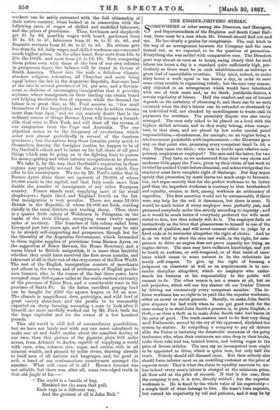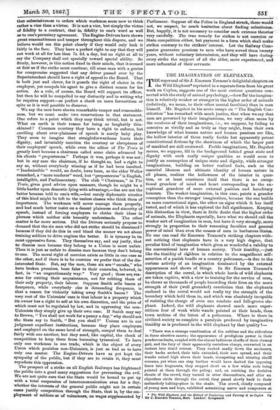THE ENGINE-DRFFERS' STRIKE.
SC°31WHERE or other among the Directors, and Managers, and Saperintendents.of the Brighton and South Coast Rail- way, there must be a man whom Mr. Disraeli should find out and use. He has clearly a genius for compromise. The real hitch in the way of an arrangement between the Company and .the men turned out, as we expected, to be the question of promotion. Everything else was settled with comparative ease. The Directors gave way almost at once as to hours, seeing clearly that for such labour ten hours a day is a standard quite sufficiently high, par- ticularly as there must be in such establishments as railways a great deal of unavoidable overtime. They tried, indeed, to make sixty hours a week equal to ten hours a day, in order to save some extra trouble in organizing reliefs ; but the men very reason- ably objected to an arrangement which would have interfered with one of their main and, as we think, justifiable desires, a certain regularity of leisure. Half the comfort and use of leisure depends on the certainty of obtaining it, and there can be no such certainty when the day's labour can be extended or shortened by an individual will, not checked by unwillingness to waste cash in payments for overtime. The pecuniary dispute was also easily arranged. The men only asked to be placed on a level with the highest skilled artisans, and as they really belong, when compe- tent, to that class, and are placed by law under special penal responsibilities,—drunkenness, for example, on an engine being a raisdemeanour punishable with imprisonment,—the Directors gave way on that point also, promising every competent hand 7s. 6d. a day. Then came the hitch ; who was to decide upon relative com- petency, employers or employed? The men said the latter, for two reasons. They have, as we understand from their very clever and moderate little paper the Train, given up their claim of last week to be tried by a mixed Court before dismissal, and acknowledge that the employer must have complete right of discharge. But they argue openly that promotion by merit leaves too much scope to favourit- ism, and argue secretly that for the perfect workman to be better paid than the imperfect workman is contrary to true brotherhood and equality, creates, in fact, among workmen an aristocracy of capacities. The first assertion would not be unreasonable, if there were any help for the evil it denounces, but there is none. It would be much better if every employer were perfectly just, and promoted everybody under him strictly according to capacity ; and so it would be much better if everybody preferred the wife most suited to him, but then nobody will do it. The employer feels as instinctively as the lover that pleasantness to himself is one of the greatest of qualities, and will never consent either to judge by a fixed code or to surrender altogether the right of choice. And he is, as we tried to show the men last week, in the right, for com- petence to drive an engine does not prove capacity for being, an engine-driver. The man may have sufficient knowledge, and yet be timid, or reckless, or evil-tempered, or of that habit of ins°, lence which seems in some natures to be the substitute for manly self-respect. To give up the right of forming a judgment on character as well as on acquirements is to sur- render discipline altogether, which no employer who under- stands his business or his responsibility to the public will consent to do. The other reason is not a reason at all, but an evil prejudice, which will one day shatter, all our Trades' Unions by driving out successively every competent member. The in- ferior workman has no right to be paid like the superior workman, either on moral or social grounds. Morally, to make John Smith give sixpence for bad work when he can get good work for the same money is to steal John Smith's pennies, is, in plain English, a theft,—as clear a theft as to make John Smith take bad bacon at the price of good. The truck-masters used to do that very thing until Parliament, moved by the cry of the oppressed, abolished the system by statute. In compelling a company to pay all drivers alike the Union is imitating the detestable meanness of the petty tradesmen who, when their customers are once deep in their books, make them take bad tea, tainted butter, and rotting sugar at the price of decent articles. The men say no incompetent man ought to be appointed to drive, which is quite true, but only half the truth. Nobody should sell diseased meat. But then nobody also should force inferior meat on an unwilling customer at the price of superior meat. That is what the claim to equality amounts to, un- less indeed every man's labour is charged at the minimum price, all flour, sold at the price of seconds. If that is the ease, then the company is not, it is true, directly robbed ; but the superior workman is. He is fined by the whole value of his superiority— a simple theft of what belongs to him. He wasn't born superior, but earned his superiority by toil and patience, and .it may, be by
that submissiveness submissiveness to orders which workmen seem now to think rather a vice than a virtues 'It is not a vice, but simply the virtue of fidelity to a contract, that is, fidelity to one's word as well as to one's pecuniary agreement. The Engine-Drivers have shown great reasonableness and temper throughout this dispute, and we believe would see this point clearly if they would only look it fairly in the face. They have a perfect right to say that they will not work at all for less than 7s. 6d. a day, but no right at auto say the Company shall not specially reward special ability. So firmly, however, is this notion fixed in their minds, that it seemed at first as if the strike must continue, till some man with a genius for compromise suggested that any driver passed over by the Superintendent should have a right of appeal to the Board. That is both just and clever, for it guards the right of choice in the -employer, yet compels his agent to give a distinct reason for his action. As a rule, of course, the Board will support its officer, but then he will be compelled to say distinctly and in writing why he requires support—as perfect a check on mere favouritism or spite as it is well possible to discover.
We say the men have shown remarkable temper and reasonable- ness, but we must make two reservations in that statement. One refers to a point which they may think trivial, but is not. What on earth is their reason for being so laughably thin- skinned? Common courtesy they have a right to enforce, but cavilling about over-plainness of speech is surely baby play. They seem to imagine that straightforwardness hurts their -dignity, and invariably mention the courtesy or abruptness of their employers' speech, while even the editor of The Train is greatly hurt because a chairman called some claim advanced by- his clients "preposterous." Perhaps it was, perhaps it was not; but in any case the chairman, if he thought so, had a right to say so, without everybody wincing as if he had been insulted. " Inadmissible " would, no doubt, have been, as the elder Weller _remarked, a "more tenderer" word, but "preposterous" is English, intelligible, and Parliamentary. The club "Chairman," in The Train, gives good advice upon manners, though he might be a little harder upon domestic lying with advantage,—lies are not the -better because told to one's wife,--but surely diplomatic niceties .of this kind might be left to the useless classes who think them of importance. The workmen will never manage them properly, and had much better insist on a decent plainness and sincerity of -speech, instead of forcing employers to clothe their ideas in phrases which neither aide honestly understands. The other matter is far more serious. Did the Drivers seriously propose to 'demand that the six men who did not strike should be dismissed ? because if they did do this in cool blood the sooner we set about training soldiers to drive engines the better. It is tyranny in its most oppressive form. They themselves say, and say justly, that to dismiss men because they belong to a Union--is most unfair. Then it is jut as unfair to dismiss men because they don't belong to one. The moral right of coercion exists as little in one case as the other, and if there is to be coercion we prefer that of the die- .interested State. Bat, say the men, these six are "sneaks," who .have broken promises, been false to their comrades, behaved, in fact, in "an ungentlemanly way." Very good ; those are rea- sons for cutting their acquaintance, not for robbing them of their only property, their labour. Suppose Smith sells bacon at fourpence, while everybody else is demanding flvepence, is that a reason for violently taking away Smith's bacon? The -very root of the Unionists' case is that labour is a property which its owner has a right to sell at his own discretion, and the price of which must not be regulated by law, and in oppressing the non- Unionists they simply give up their own case. If Smith may say to Brown, "You shall not work for a penny a day," why should not -the State say to Smith, "But you shall ?" Unions are in our judgment expedient institutions, because they place employers and employed on the same level of strength, compel them to deal fairly with one another, but they need, like capital, the check of -competition to keep them from becoming tyrannical. To have only one workman in one trade, which is the object of every Union which punishes non-Unionists, is just as bad as- to have only one master. The Engine-Drivers have as yet kept the sympathy of the public, but if they are to retain it, they must repudiate this oppression.
The prospect of a strike on all English Railways has frightened the public into a good many suggestions for preventing the evil. We are not quite sure that the State would be bound to put up with a total suspension of intercommunication even for a day, whether the interests of the general public might not in certain cases justify competition through the State, that is, by the em- ployment of soldiers or of volunteers, on wages supplemented by
Parliament. Suppose all the Police in England struck, there would not, we suspect, be much hesitation about finding substitutes. But, happily, it is not necessary- to consider such extreme theories very carefully. The true remedy for strikes is not -coercion or State competition either, but payment in a form which shall make. strikes contrary to the strikers' interest. Let the Railway Com- panies guarantee pensions to men who have, served them twenty years, without voluntary intermission, and they will have during - every strike the support of all the older, more experienced, and- more influential of their servants.



































 Previous page
Previous page